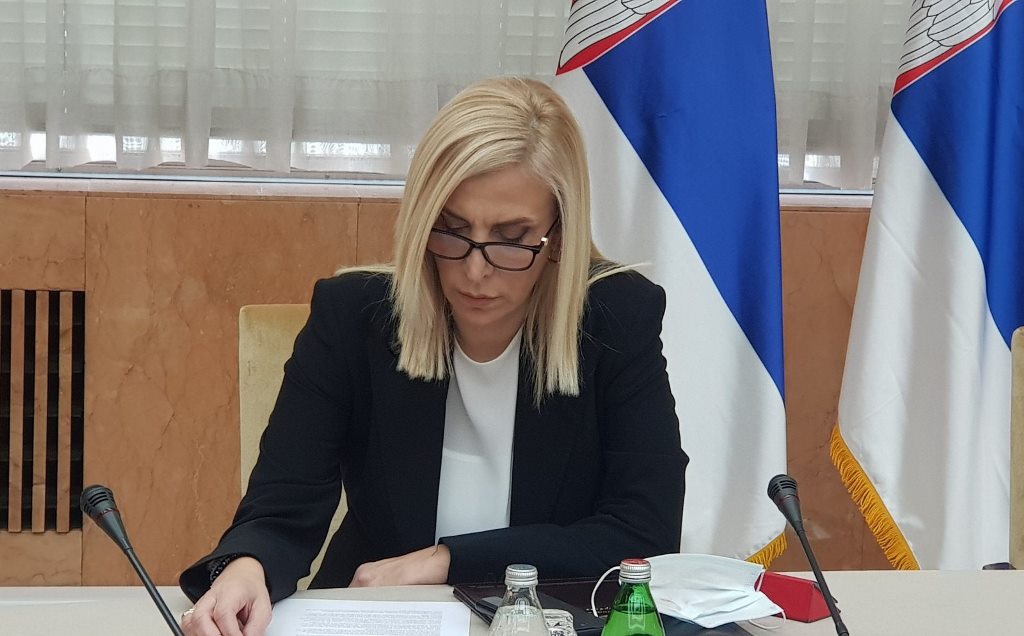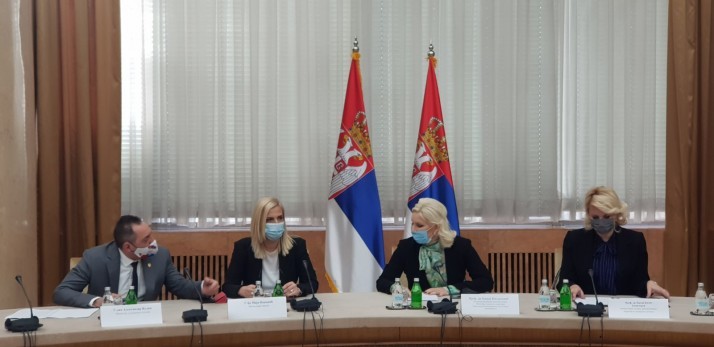On 29 December 2020, Minister of Justice of the Republic of Serbia Maja Popović attended the first meeting of the Working Group tasked to draft the National Strategy for Prevention and Combating of Domestic and Intimate Partner Violence against Women 2020−2025 and a proposal of the Action Plan for the Implementation of the National Strategy for Prevention and Combating of Domestic and Intimate Partner Violence against Women 2020−2022.
Minister Popović spoke in the opening session of the meeting, as did Deputy Prime Minister, President of the Coordination Body for Gender Equality and Minister of Mining and Energy Zorana Mihajlović, Minister of the Interior Aleksandar Vulin, Minister of Human Rights and Social Dialogue Gordana Čomić, and Minister of Labour, Employment, Veteran and Social Affairs Darija Kisić–Tepavčević.
Minister Popović noted that the Domestic Violence Prevention Act ― which entered into force on 1 June 2017 ― had shifted boundaries and improved the processing of domestic violence cases by all competent state authorities. She said that there were 87 coordination and cooperation groups/subgroups in Serbia comprising a deputy public prosecutor, a competent police officer and a social worker from a social welfare centre who met at least once every 15 days in order to apply a multisectoral approach to reviewing each reported case of domestic violence.
Between the Act enforcement date and 30 November 2020, i.e. in three and a half years since the enactment, coordination and cooperation groups met 9,544 times, reviewed 170,295 reported cases of domestic violence, and prepared 53,235 individual plans of protection and support of victims. In that same period, in 61,549 of reviewed cases the courts of law extended the emergency measure of temporary removal of abusers from residence and temporary restraining order for 30 days, pursuant to the Act.
According to the statistical data on criminal sanctions and penal policy on domestic violence, 1,310 of convictions by final judgment were passed between 1 January 2019 and 31 December 2019.
A suspended sentence was ordered against 807 abusers, and a prison sentence against another 490. Out of those 490 persons, 204 were sentenced to imprisonment of up to 6 months, 147 were sentenced to imprisonment of 6 months to a year, 82 were sentenced to up to one year in house incarceration, 47 were sentenced to imprisonment of one to three years, 9 were sentenced to imprisonment of three to five years, and one person was sentenced to imprisonment of 5 to 10 years.
In that same period, different safety measures were pronounced in 348 cases, i.e. mandatory psychiatric treatment in a health institution in 49 cases, mandatory outpatient psychiatric treatment in 40 cases, mandatory drug abuse treatment in 24 cases, mandatory alcoholism treatment in 212 cases, and the measure of temporary seizure was pronounced against 23 persons.
Minister Popović took the opportunity to invite the media to take part in combatting domestic violence by reporting on the outcome of the related court proceedings. ‘We need the help of all media. By reporting on case judgements, i.e. domestic violence sanctioning, the media would help send the message that the Republic of Serbia had zero tolerance for violence against women, and that violence against women was punishable’.




